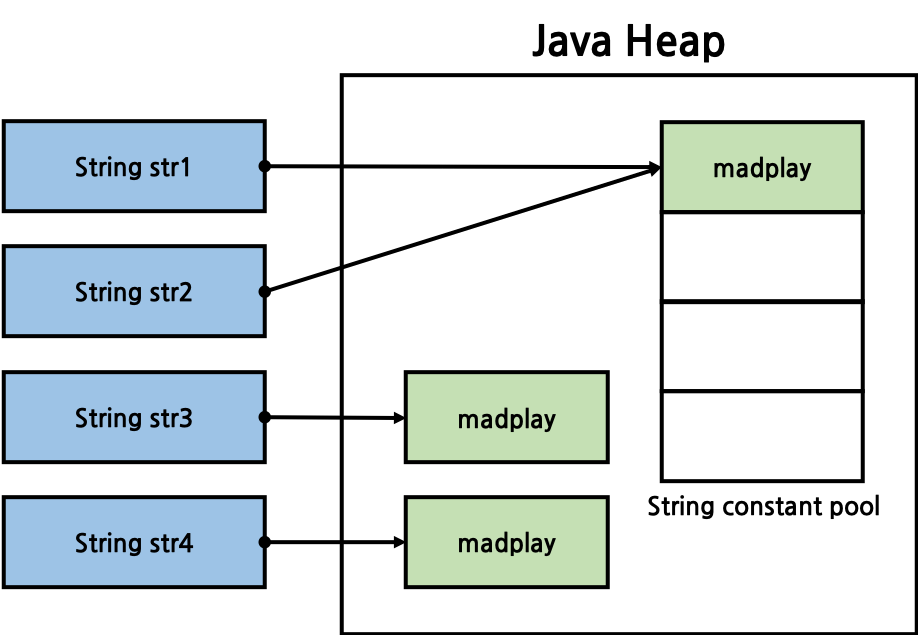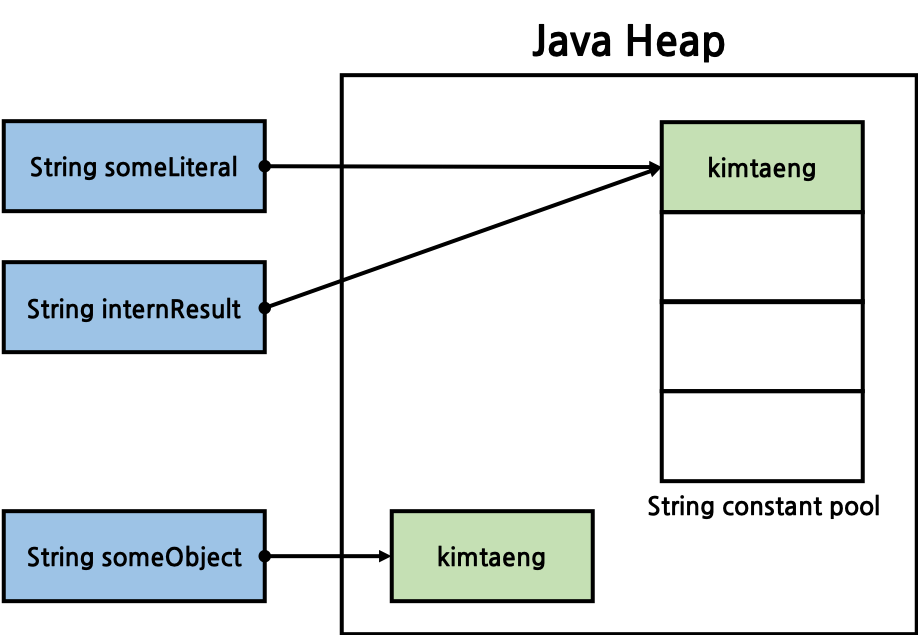문자열을 생성해보자. new String(“Hello”); vs “Hello”;
Java에서 문자열(String)을 선언하는 방법은 아래와 같다.
String str1 = new String("madplay");
String str2 = "madplay";
첫 번째는 생성자인 new 연산자를 이용한 문자열 생성 방식, 두 번째는 문자열 리터럴 생성 방식인데, 겉으로 보았을 때의 문법 차이도 있지만 실제 메모리에 할당되는 영역에도 차이가 있다.
new 연산자를 통해 문자열 객체를 생성하는 경우 메모리의 Heap 영역에 할당되고
두 번째 방법인 리터럴을 이용한 경우에는 String Constant Pool이라는 영역에 할당된다.
참고로 문자열이 담기는 상수풀의 위치는 자바 7부터
Heap영역으로 옮겨졌다.
아래와 같이 문자열을 선언해보자.
String str1 = "madplay";
String str2 = "madplay";
String str3 = new String("madplay");
String str4 = new String("madplay");
str1 = str2;
// ... 생략
자바 힙(heap) 영역에 매핑해본다면 아래와 같은 모습으로 그려볼 수 있다. 상수풀에 생성된 문자열의 경우 하나만 존재하게 된다. 따라서 str1, str2는 같은 문자열을 참조하게 된다.
반대로 heap 영역에 객체를 생성한 경우 각각의 인스턴스가 생성되기 때문에 str3, str4는 각각 다른 문자열을 참조한다.

문자열을 비교해보자. equals vs ==
다음의 문자열을 비교하는 간단한 코드를 살펴보자.
/**
* Compare String.
*
* @author kimtaeng
* created on 2018. 5. 12.
*/
public class MadPlay {
public static void main(String[] args) {
String someLiteral = "kimtaeng";
String someObject = new String("kimtaeng");
System.out.println(someLiteral.equals(someObject)); // print 'true'
System.out.println(someLiteral == someObject); // print 'false'
}
}
동일하게 ‘kimtaeng’이라는 문자열을 선언하였는데 String의 eqauls 메서드로 비교한 경우는 true,
== 연산으로 비교한 경우는 false가 반환된다. 이유가 뭘까?
String의 eqauls 메서드를 조금 더 자세히 살펴보자. 단순하게 문자열의 값을 비교한다.
/**
* Compares this string to the specified object. The result is {@code
* true} if and only if the argument is not {@code null} and is a {@code
* String} object that represents the same sequence of characters as this
* object.
*
* @param anObject
* The object to compare this {@code String} against
*
* @return {@code true} if the given object represents a {@code String}
* equivalent to this string, {@code false} otherwise
*
* @see #compareTo(String)
* @see #equalsIgnoreCase(String)
*/
public boolean equals(Object anObject) {
if (this == anObject) {
return true;
}
if (anObject instanceof String) {
String anotherString = (String) anObject;
int n = value.length;
if (n == anotherString.value.length) {
char v1[] = value;
char v2[] = anotherString.value;
int i = 0;
while (n-- != 0) {
if (v1[i] != v2[i])
return false;
i++;
}
return true;
}
}
return false;
}
반면에 == 연산의 경우 객체의 주소값을 비교한다. 그렇기 때문에 new 연산자를 통해 Heap 영역에 생성된 String과
리터럴을 이용해 String Constant Pool 영역에 위치한 String의 주소값은 같을 수가 없다.
왜 그럴까?
String의 equals와 == 연산의 차이에 대한 질문은 IT기업 면접 문제에서 많이 출제된 것 같다. (요즘은 이런 질문은 나오지도 않는 듯…) 그만큼 동작 방식에 대한 차이를 조금 더 명확하게 알아할 필요도 있다.
문자열 리터럴의 경우 내부적으로 String의 intern 메서드를 호출하게 된다. Java API를 통해 메서드를 살펴보면
/**
* Returns a canonical representation for the string object.
* <p>
* A pool of strings, initially empty, is maintained privately by the
* class <code>String</code>.
* <p>
* When the intern method is invoked, if the pool already contains a
* string equal to this <code>String</code> object as determined by
* the {@link #equals(Object)} method, then the string from the pool is`
* returned. Otherwise, this <code>String</code> object is added to the
* pool and a reference to this <code>String</code> object is returned.
* <p>
* It follows that for any two strings <code>s</code> and <code>t</code>,
* <code>s.intern() == t.intern()</code> is <code>true</code>
* if and only if <code>s.equals(t)</code> is <code>true</code>.
* <p>
* All literal strings and string-valued constant expressions are
* interned. String literals are defined in section 3.10.5 of the
* <cite>The Java™ Language Specification</cite>.
*
* @return a string that has the same contents as this string, but is
* guaranteed to be from a pool of unique strings.
*/
public native String intern();
간단하게 요약해보면 intern 메서드는 해당 문자열이 String Constant Pool에 이미 있는 경우에는 그 문자열의 주소값을 반환하고 없다면 새로 집어넣고 그 주소값을 반환한다.
아래의 intern 메서드를 이용한 문자열을 비교하는 코드를 살펴보자.
/**
* Compare String with intern method.
*
* @author kimtaeng
* created on 2018. 5. 12.
*/
public class MadPlay {
public static void main(String[] args) {
String someLiteral = "kimtaeng";
String someObject = new String("kimtaeng");
String internResult = someObject.intern();
System.out.println(someLiteral.equals(someObject)); // print 'true'
System.out.println(someLiteral == internResult); // print 'true'
}
}
기존에 new연산자를 통해서 생성된 String 객체와 리터럴로 생성된 String 객체의 주소값을 비교하였을 때는 같지 않다는 결과를
알 수 있었으나, new연산자로 생성된 객체를 intern 메서드를 이용한 후 비교하는 경우에 리터럴로 생성된 객체와 주소값이 같음을 알 수 있다.

앞서 말한 것처럼 ‘kimtaeng’ 이라는 문자열이 String Constant Pool에 존재하는지 확인하는 과정에서 문자열이 이미 존재하기 때문에 동일한 주소값이 반환되었고 비교 연산 결과 주소값이 같게 된 것이다.
Immutable 하다.
문자열 리터럴도 상수로서 불변이다. 이러한 특성 때문에 참조하려는 문자열이 같다면 동일한 객체(상수풀)을 참조할 수 있다. 아래의 코드에서 someObject를 new 연산자가 아닌 리터럴 방식으로 선언한다면 someLiteral과 동일한 객체를 참조하게 될 것이다.
String someLiteral = "kimtaeng";
String someObject = new String("kimtaeng");
String weAreSameRef = "kimtaeng"; // someLiteral과 같은 객체 참조
자바 언어가 담긴 자바 소스 파일(.java)이 클래스 파일(.class)로 컴파일되고 JVM(Java Virtual Machine)에 로드(load) 될 때, JVM은 String Constant Pool에 동일한 문자열(위 코드에서는 kimtaeng)이 있는지 확인하고 이미 존재한다면 재사용을 하고 없는 경우에는 새로운 문자열을 만든다.
이러한 관점에서 여러 레퍼런스가 같은 문자열 리터럴을 참조하더라도 서로 영향이 없도록 불변(immutable) 해야 하는데
다행히 thread-safe 하기 때문에 멀티 스레드 환경에서 공유하여 사용할 수 있다.
String의 최적화
불변인 String을 가지고 연산을 할 때는 고려할 부분이 있다. 문자열을 + 연산자 등을 이용하여 다른 문자열을 추가할 때는,
기존 문자열에 새롭게 문자열이 추가되는 것이 아니라, 새로운 문자열 객체를 만들고 그 객체를 참조하도록 한다.
따라서 기존 문자열은 레퍼런스 참조가 사라져 가비지 컬렉터(Garbage Collector)의 수집 대상이 된다.
하지만 자바 5버전부터는 String의 연산 과정이 조금 달라졌다. 내부적으로 StringBuilder를 사용하게 변경되었다.
Spring Constant Pool
상수풀(String Constant Pool)의 위치는 Java 7부터 Perm 영역에서 Heap 영역으로 옮겨졌다.
Perm 영역은 실행 시간(Runtime)에 가변적으로 변경할 수 없는 고정된 사이즈이기 때문에 intern 메서드의 호출은
저장할 공간이 부족하게 만들 수 있었다. 즉 OOM(Out Of Memory) 문제가 발생할 수 있는 위험이 있었던 것이다.
Heap 영역으로 변경된 이후에는 상수풀에 들어간 문자열도 Garbage Collection 대상이 된다.
관련 링크) JDK-6962931 : move interned strings out of the perm gen(Oracle Java Bug Database)
Java 7버전에서 상수풀의 위치가 Perm 영역(정확히 풀어서 써보면 Permanent Generation)에서 Heap으로 옮겨지고
이후에 Java 8 버전에서는 Perm 영역은 완전히 사라지고 이를 MetaSpace라는 영역이 대신하고 있다.